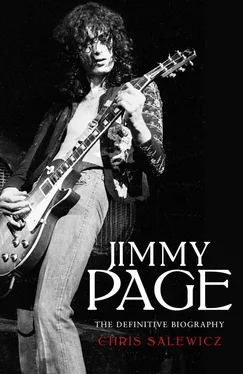Many of Page’s expenditures – the palatial residences, the vintage cars he was unable to drive (he never passed his test), the enormous collection of rare guitars – seemed designed to garner respect and support among the world’s wealthy and influential, to make people aware of him, to elevate his extraordinarily inscrutable profile, and to establish himself as one of the principal men about whichever town he found himself in.
But at the same time, here was a rebel cocking a snook at the Establishment, having what he knew he wasn’t meant to have. With Led Zeppelin there always was that sense of being resolutely ‘underground’, a card played with perfect panache by the band for most of their career: hardly ever on television, with no singles released in their homeland, Zeppelin existed from the very beginning as their own outsider identity. In a sense the damning review of their first album by John Mendelsohn in Rolling Stone , a magazine Page came to loathe, was perfect for them; it set in motion the ‘us against them’ agenda from which Led Zeppelin’s success soared.
By 1977, the year their myth savagely unravelled, they would come to be seen as the embodiment of behemoth rock, all that the new punk movement stood against, but when Led Zeppelin started out in 1968 their anti-Establishment stance was about as punk as it could be.
‘The big question today is, Why hasn’t he done new music?’ said Michael Des Barres. ‘Well, why does he have to? Jimmy Page is his own art piece, a performance artist, and he’s busy curating his legacy. There is nobody else whose roadie was Aleister Crowley. And it worked. Led Zeppelin were not a band; they were a cult.
‘Led Zeppelin brought together all those kids who otherwise would just hang around parking lots in two-bit American cities, kids for whom the obvious decadence of the Rolling Stones didn’t really connect. Instead, Led Zeppelin were their cult; they became a focus for and brought together all those disaffected, lost souls who would take the fantasy world of the group and its subject matter and project onto it their own interpretation of what they were.’
The world was ready for just such a package. Around the time the Rolling Stones were writing 1968’s ‘Sympathy for the Devil’, Mick Jagger and Keith Richards had dabbled in a friendship with the Californian film director and occultist Kenneth Anger, but – as though proof that in such areas they were distinctly lightweight – fled his company the next year after the debacle of Altamont. Instead it was Led Zeppelin, driven by Page’s assiduous academic interest in altered states and realities, that provided the soundtrack to the building public interest in the occult. In 1972 TIME magazine ran a cover story bearing the strapline ‘Satan Returns’. Colin Wilson’s mammoth groundbreaking study simply titled The Occult had been published in 1971. More populist was the Man, Myth and Magic partwork series, which commenced in 1970, providing highly readable accounts of a secret world that was exciting to the newly stoned with their now-opened third eyes. As was the manner of partworks, Man, Myth and Magic was extensively plugged in television adverts, featuring an image of a demonic figure, painted by Austin Osman Spare. Spare had been close to Aleister Crowley and was sometimes described as ‘Britain’s greatest unknown artist’; Page would become the world’s leading collector of Spare’s work.
By then there was something frightening about the very notion of Led Zeppelin. After I interviewed Page in 1979 in a relatively forthright manner for the NME , a senior editorial member asked me if I wasn’t nervous of any potential repercussions. When I told casual acquaintances I was writing this book, I was met with similar responses: ‘Jimmy Page? Black magic?’
For some years – a decade or so – this was the prevailing view of Page. But of course time is a healer, so it should be no great surprise that by the end of the first decade of the twenty-first century, and in his own seventh and eighth decades, Page had redeemed himself to become the most loved and revered of all classic rock stars.
This redemption was fitting, given that this is the man who almost singlehandedly established the notion of the guitar hero as part of contemporary culture. ‘What about Eric Clapton?’ you may ask. No: Clapton was too diverse in the paths he trod. It was the singularity of Page’s work with his vehicle Led Zeppelin, underpinned by his extraordinarily startling and sinisterly attractive appearance, that awarded him the guitar hero crown. Guitar hero? Guitar god, more like.
His is an extraordinary story that has taken him to the very darkest of areas – but always driven by the search for his art. You might not approve of the methods employed to unleash and liberate his creativity, and you can’t avoid the impression that Page was vain, arrogant, fanatical and power-hungry, and indulged in a scandalous private life – much, of course, to the adoration of his fans. Yet many of the accusations against him were probably fabricated or at least exaggerated by his numerous enemies – though many of these, in the timbre of the times, were no more than cosmic spivs.
Certainly, Page was a man of his age – ambitious, worldly and pleasure-loving – but the demonic caricature of evil is mostly an elaborate myth. Not that he didn’t gladly play it himself, of course. By mentioning in a very matter-of-fact manner how the congregation of the original church at Boleskine House, a home of Crowley, had burned to death, Page was positioning himself as being metaphysically hard, a cosmically tough motherfucker with complex connections to ghoulish gangs of strange spirits. It was, of course, a good way to attract impressionable women, a variant on those college student ‘astrologers’ who would take girls back to their rooms to read their charts and then shag them.
For a time Page was fascinated with – to give it its full title – the Isis-Urania Temple of the Hermetic Order of the Golden Dawn, a late-19th-century group of occultists whose members had included the Irish poet W. B. Yeats and Crowley, who – unsurprisingly – considered his poetry superior to that of Yeats and had a bitter falling out with the Irishman.
‘Much of the Golden Dawn magic,’ wrote Gary Lachman in his biography of Crowley, ‘as well as Crowley’s, has to do with what is called the “assumption of the god form”, when the magician imagines he has become the particular god he wants to invoke by visualising his form enveloping his own.’ Except you might feel that the ‘particular god’ Page wished to invoke was none other than himself: Jimmy Page, rock god.
And this stance was carried through to every aspect of his existence, including his appearances on stage.
‘On the surface,’ writes the American cultural commentator Erik Davis, ‘Page’s live performances present typical rockist values of spontaneity, virtuosity and sweaty abandon. But Page adds a novel element to the figure of the guitar hero, an element … of mystery. So even as Page bares his cock rock before tens of thousands of fans, the Zoso doodle emblazoned on his clothes, he reminds us that he knows something that we don’t. There is a gap between the hero whose performance we consume and the sage behind the curtain, who remains concealed, literally occult. This mystique makes Page far creepier than Ozzy Osbourne, who is hiding nothing, except maybe his debt to The Munsters .’
A balanced appreciation of Page’s character reveals traits both admirable and detestable, but claims of his ethical failings have sometimes overshadowed an appreciation of his keen creative mind. Besides, his flamboyantly dissolute lifestyle was hardly different from that of many other rock stars of his age – such as David Bowie, or Mick Jagger, or Rod Stewart.
Читать дальше












